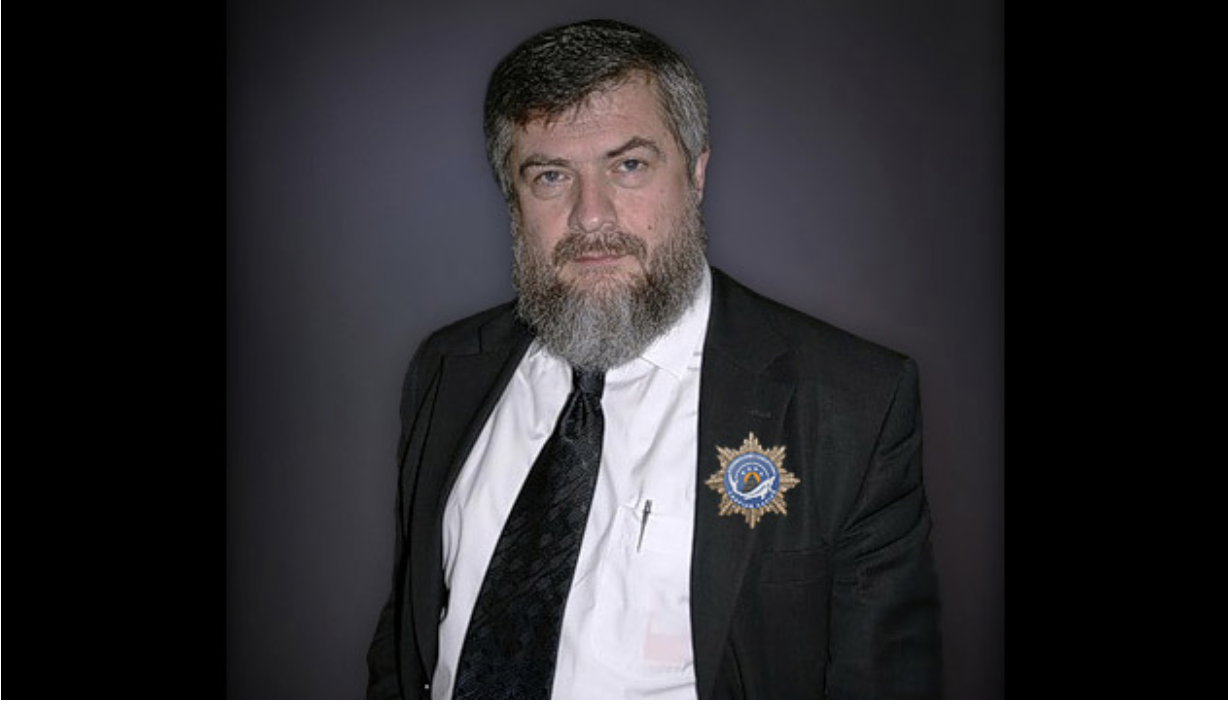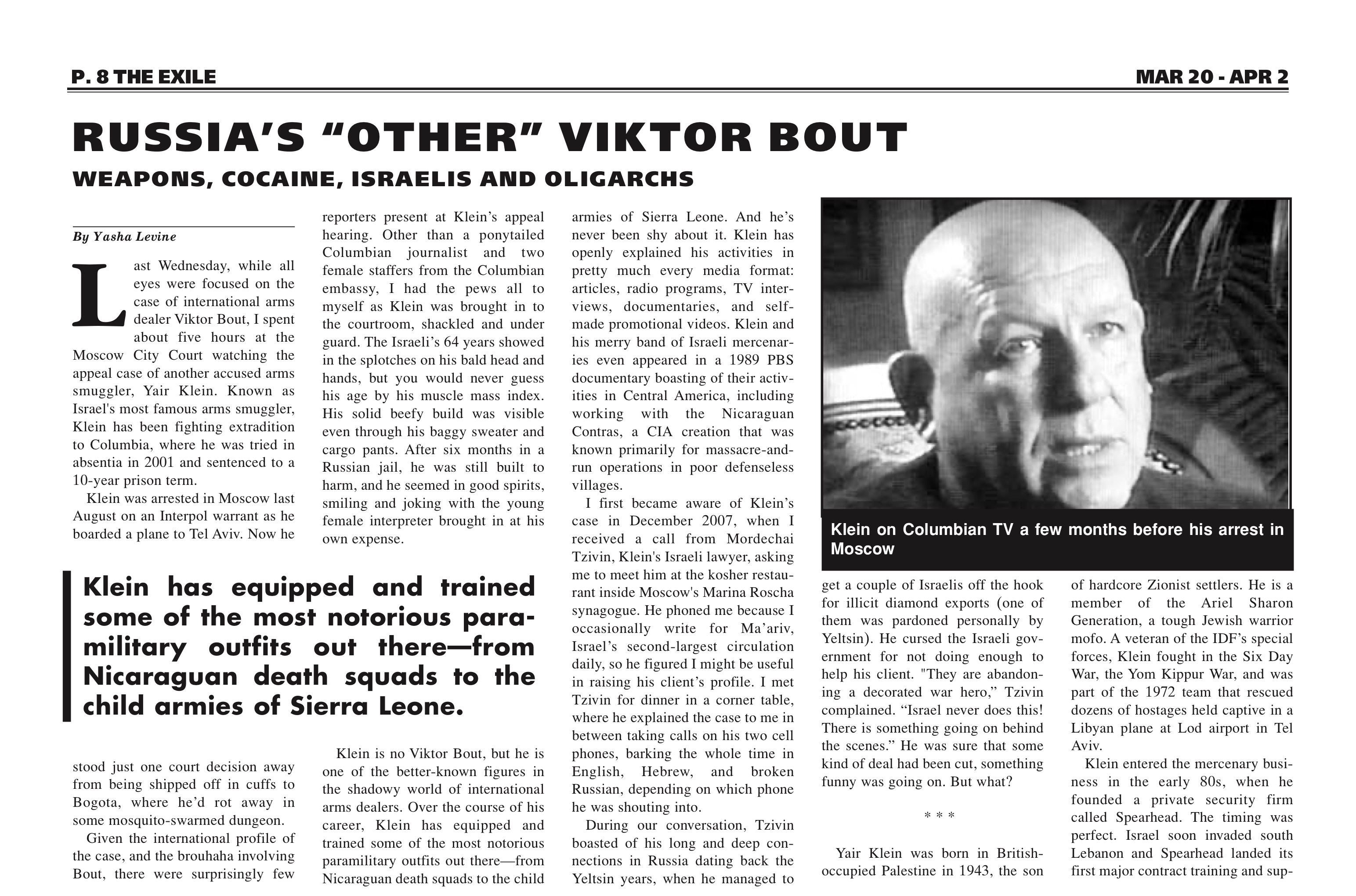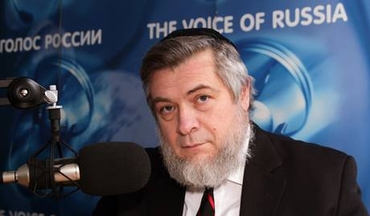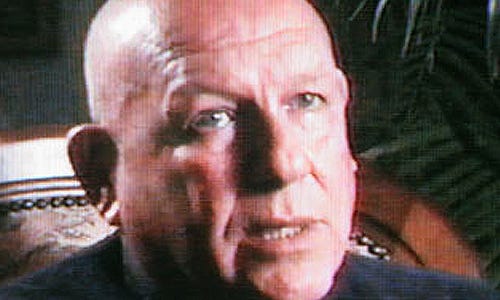by Yasha Levine
I was looking through some notes and I realized I stumbled onto one of these weird characters years ago — thirteen years, to be exact.
Back in Moscow in 2007, I got an email from an Israeli attorney with a request to meet at a kosher restaurant run by Chabad. He wanted to talk to me about a client who had recently been in the news in Russia, Israel, and Colombia — a certain gun runner and mercenary by the name of Yair Klein.
Klein had been grabbed and thrown in jail in Moscow, the result of some kind of arms deal gone wrong. And the attorney was peddling his story, hoping I would write about the evil forces arrayed against his innocent — or to be precise, “innocent” — client. I took the bait and met with the guy and was quickly drawn into a shady world of Israeli-Russian-Colombian business and politics — a world that included Soviet Zionist zealot by the name of Avigdor Eskin.
Avigdor Eskin is not a household name, but he’s sorta infamous in Israeli politics.
He was born in Moscow, converted to Zionism as a teenager and left for Israel in the 1970s. Once in the Holy Land, he was drawn to the then-fringe-but-now-mainstream Israeli right of Meir Kahane — the FBI snitch and founder of Jewish Defense League who got his start in the “Save Soviet Jews” movement by bombing Soviet offices in New York.
Like Kahane, Eskin has been on the genocidal/total ethnic cleansing side of the “Palestinian Question” and has opposed any concessions, no matter how tiny, to the Palestinian side. “There is only one way to restore peace and that is the transfer of the Arab population to Arab countries,” he said back in the 1980s.
His biggest claim to fame was an invocation of a kabbalistic death curse he made in 1995 against Yitzhak Rabin for signing the meager Oslo Accords with Yassir Arafat. The curse was proclaimed outside of Rabin’s official residence, and the stunt was part of a larger wave of fear and anger being whipped in Israel against any sort of perceived peace. And…the curse worked. A month later, Rabin was assassinated by a young religious extremist.
Eskin is still proud of what he did and proud of the assassin who pulled the trigger. “We won,” he told Haaretz. “Look, the fact is that it worked: We halted the Oslo process and that’s what matters. It could have been a destructive process that would have brought ruin upon the Jewish people.”
Yep, the Israeli op to bring Soviet Jews into the Zionist faith worked like a charm. The Holy Land got some real quality Soviet converts to work with!
Today, Eskin — like the previous convert to Zionism I wrote about — is a beloved guest on Russian state media. He’s tapped for his expertise on Israeli and post-Soviet issues — from Russia to Armenia to Ukraine to Azerbaijan. He’s also accused by some of his old acquaintances of being a Shin Bet agent and of previously working for the KGB — which to be honest, doesn’t really surprise me.
Anyway, I figured I’d rescue another piece of my writing from the Internet’s gaping memory hole. I think you’ll enjoy this one.
—Yasha Levine
Yair Klein: Russia's "Other" Viktor Bout
Weapons, Cocaine, Israelis and Oligarchs
By Yasha Levine • The eXile • March 28, 2008
Two weeks ago, while all eyes were focused on the case of international arms dealer Viktor Bout, I spent about five hours at the Moscow City Court watching the appeal case of another accused arms smuggler, Yair Klein. Known as Israel’s most famous arms smuggler, Klein has been fighting extradition to Colombia, where he was tried in absentia in 2001 and sentenced to a 10-year prison term.
Klein was arrested in Moscow last August on an Interpol warrant as he boarded a plane to Tel Aviv. Now he stood just one court decision away from being shipped off in cuffs to Bogota, where he’d rot away in some mosquito-swarmed dungeon.
Given the international profile of the case, and the brouhaha involving Bout, there were surprisingly few reporters present at Klein’s appeal hearing. Other than a ponytailed Colombian journalist and two female staffers from the Colombian embassy, I had the pews all to myself as Klein was brought into the courtroom, shackled and under guard. The Israeli’s 64 years showed in the splotches on his bald head and hands, but you would never guess his age by his muscle mass index. His solid beefy build was visible even through his baggy sweater and cargo pants. After six months in a Russian jail, he was still built to harm, and he seemed in good spirits, smiling and joking with the young female interpreter brought in at his own expense.
Klein is no Viktor Bout, but he is one of the better-known figures in the shadowy world of international arms dealers. Over the course of his career, Klein has equipped and trained some of the most notorious paramilitary outfits out there—from Nicaraguan death squads to the child armies of Sierra Leone. And he’s never been shy about it. Klein has openly explained his activities in pretty much every media format: articles, radio programs, TV interviews, documentaries, and self-made promotional videos. Klein and his merry band of Israeli mercenaries even appeared in a 1989 PBS documentary boasting of their activities in Central America, including working with the Nicaraguan Contras, a CIA creation that was known primarily for massacre-and-run operations in poor defenseless villages.
I first became aware of Klein’s case in December 2007, when I received a call from Mordechai Tzivin, Klein’s Israeli lawyer, asking me to meet him at the kosher restaurant inside Moscow’s Bolshaya Bronnaya synagogue. He phoned me because I had written a few things for Ma’ariv, Israel’s second-largest circulation daily. So he figured I might be useful in raising his client’s profile. I met Tzivin for dinner in a corner table, where he explained the case to me in between taking calls on his two cell phones, barking the whole time in English, Hebrew, and broken Russian, depending on which phone he was shouting into.
During our conversation, Tzivin boasted of his long and deep connections in Russia dating back to the Yeltsin years, when he managed to get a couple of Israelis off the hook for illicit diamond exports (one of them was pardoned personally by Yeltsin). He cursed the Israeli government for not doing enough to help his client. “They are abandoning a decorated war hero,” Tzivin complained. “Israel never does this! There is something going on behind the scenes.” He was sure that some kind of deal had been cut, something funny was going on. But what?
Yair Klein was born in British-occupied Palestine in 1943, the son of hardcore Zionist settlers. He is a member of the Ariel Sharon Generation, a tough Jewish warrior type. A veteran of the IDF’s special forces, Klein fought in the Six Day War, the Yom Kippur War, and was part of the 1972 team that rescued dozens of hostages held captive in a Libyan plane at Lod airport in Tel Aviv.
Klein entered the mercenary business in the early 80s, when he founded a private security firm called Spearhead. The timing was perfect. Israel soon invaded south Lebanon and Spearhead landed its first major contract training and supplying basic army gear to the Phalangists, the notorious Lebanese Christian militia responsible for shooting up the Sabra and Shatila refugee camps. The attack left hundreds of Palestinians dead and tarnished Israel’s reputation around the world. According to a 2007 interview Klein gave on Colombian TV, his infant firm made $2 million from that deal alone. He was off and running.
In the mid and late 80s, Klein made a number of trips to Colombia to arm and train local drug cartel militias. These militias formed the basis of the right-wing paramilitary death squads who squared off against the FARC guerillas (who were at the time being armed by Klein’s Russian-Jewish competitor, Viktor Bout) and sometimes the Colombian government. One of Spearhead’s Colombia employees, Lt. Col. Amatzia Shuali, later explained the company’s role in Colombia to American public television: “Yair mentioned the Contras. I think here it’s the same thing: the Americans won’t interfere directly. We are willing to do it.” (Klein maintains that Bogota was aware of his business activities.)
Klein’s training activities had a big and bloody impact on Colombia. Local human rights activists accuse Klein of singlehandedly turning inept cartel goons into highly efficient death squads. Bogota, which at first turned a blind eye to the right-wing militias, were forced to finally take action when government officials started getting knocked with alarming regularity and professionalism. In 1989, the shit hit the fan when a promotional video showing Klein and other Spearhead employees training drug cartel militias was leaked to the public, causing a PR disaster for Klein—and for Israel. Spearhead was operating under an Israeli government license, putting Israel on the hook. A subsequent investigation by the Colombian government exposed Klein’s ambitious plans to set up a “freedom fighter” training camp on the island of Antigua. Along with a diploma, every graduate would be sent back to Colombia with his very own machine gun.
Klein and several other former Israeli officers fled as they were charged in Colombia. The government of Israel acknowledged Klein’s activities and punished him with fines. While Klein got away with a slap on the wrist, one of his associates was discovered dead not long afterwards, shot and stuffed into the trunk of his car, after he’d complained of being tailed by Mossad agents. It appears as if this associate took the fall for Klein’s operation.
But even all this bad press didn’t put a damper on Spearhead’s activities. In the mid 90s, Klein was reported to have operated in the lucrative and gory business of blood diamonds: Sierra Leone and Liberia. The details, as always, are murky and hard to verify, but one of Klein’s few known transactions in Africa involved an attempt to trade a military helicopter in exchange for access to a Sierra Leone diamond mine. He was later arrested in Freetown on charges of supplying the rebel Revolutionary United Front with weapons and was served a death sentence. He got out in 16 months, cleared of all charges. (It’s rumored that he was sprung out of prison in a joint Israeli-American black op.)
His most recent deal, involving armored vehicles, brought him to Moscow in the summer of 2007, and from there, to jail, where he’s been sitting ever since.
Over his long and extraordinary career, Klein has always been able to count on powerful friends to get him out of trouble. But something had changed by the time of his latest arrest.
From the moment he was dragged to a Moscow prison, the Israeli government has treated Klein as if they’d washed their hands and wanted nothing more to do with him. The Israeli embassy in Moscow refused to provide Klein with even the most basic citizen services: no embassy representatives came to visit him in jail, nor was he provided with an interpreter. At the appeal hearing, Klein claimed unfair treatment, including unlawfully restricted access to the telephone, newspapers and his attorney.
According to his attorney Tzivin, Klein believes the CIA is to blame for his predicament. “It’s possible America is leaning on Israel to give him up to the Colombians so they could have a trophy in the War on Drugs,” explained Tzivin. Israel, which relies heavily on American aid, may have agreed and cut Klein loose as a favor to the CIA and the DEA. Tzivin was adamant that Israel would never otherwise sit back and allow Russia to extradite the Israeli war hero.
CIA or not, the reality is that Israel and Colombia have their own growing trade ties that could justify a decision to leave Klein out to dry. Just a week before Klein’s appeal, Israel’s Prime Minister Shimon Peres hosted Colombian Defense Minister Juan Manuel Santos at his residence in Jerusalem. Referring to the 1950s, when Colombia shipped weapons to Israel in defiance of an international embargo, Peres said: “In recent years the situation has come full circle, and Israel is able to repay Colombia in kind.”
Repay indeed. In early March, Israel supplied Bogota with drone aircraft, arms, ammunition and electronic equipment for use in combating the country’s drug lords (and guerrillas). Israel also has plans to refurbish Colombia’s aging air force. Neither side wants Klein running around smearing Colombia and gloating about his own invincibility. It’s not hard to see how his extradition is a win-win situation for everyone except him: Israel can develop its newly profitable relationship with Colombia, and Colombia gets a wanted criminal. Even Russia looks good, coming off as a law-abiding country that plays by the rule of law, a responsible member of the international community.
The 64-year-old Klein, meanwhile, will be stuck in some foul hole, getting some very late-in-life Spanish lessons as he struggles to survive until release.
Whoever was putting the screws to his client, Tzivin’s job was to find a way around it and beat the extradition. To do so, Tzivin planned to dust off some old personal favors owed to him in Russia. He also had what he thought might be a secret weapon.
I didn’t think I could be shocked by much after hearing all the details of Klein’s case, but I was wrong. Midway through our meal at the kosher restaurant, we were joined by a tall orthodox Jew sporting a long raggedy beard and dressed in a top hat and black trench coat who had just flown to Moscow from Tel Aviv. He was introduced to me as Avigdor Eskin—as I later realized, one of the most notorious fringe-characters in Israel, famous for having staged a ceremonial death-curse against the Israeli Prime Minister Yitzhak Rabin just a month before he was assassinated. Eskin was jailed for four months after the assassination for incitement to terrorism and blamed by many for the murder.
In the half-hour since I was introduced to the world of Yair Klein, things just kept getting weirder.

Eskin, the man who put a death curse on Yitzhak Rabin. (The site Caviar Diplomacy gushes: "Israeli political scientist, publicist and public figure.."
According to Kabala tradition, the curse supposedly became active 30 days after the incantation. True to the curse’s power, Rabin was shot exactly 32 days later by Yigal Amir, an extremist settler steeped in the ideology of people like Eskin.
In 2007, Eskin was arrested in Israel for wiretapping the offices of Israel’s most powerful ultranationalist extremist, Avigdor Lieberman, Israel’s Strategic Affairs Minister. The reason for wiretapping Lieberman was to get information on his powerful associate, the one-time Russian metals oligarch Michael Chernoy, who had to flee Russia for Israel, where he lost his vast metals holdings to RusAl oligarch Oleg Deripaska. Israeli police found evidence that Deripaksa had hired Eskin to spy on his old associate so that he could smear him with damning kompromat, or “compromising material.”
Eskin was still serving time in Israel for his wiretapping crime when he was recruited to help Klein. It’s not clear how Eskin got out of jail for a crime that serious. If Tzivin is right, Klein still has some powerful people on his side. Eskin was the go-to man, as he’s known for his ties to Russia’s political and business elite. So Tzivin brought Eskin to Russia to help him work their Russian contacts on behalf of Klein.
Turns out, Eskin wasn’t much help. A few weeks after he arrived in Moscow, on December 31, the Russian General Prosecutor’s office announced that Klein would be extradited to Colombia, no matter what trump cards Tzivin thought he had up his sleeve.
At the hearing on March 12, the judge rejected Klein’s appeal. Klein had wanted his lawyers to argue that his extradition was a CIA conspiracy, but his counsel refused and stuck to arguments more easily proved: 1) that Colombia’s statute of limitation on Klein’s crimes had expired; and 2) that Colombia couldn’t guarantee his safety once he was extradited back. To prove the second point, his lawyers cited a UN report that accused Colombia of serious human rights violations. The Russian prosecutor had a field day with that.
“Well, the UN has criticized Israel for human rights abuses in the same breath as they criticized Serbia and Chechnya. You cannot take that seriously,” he said with a smirk.
As the judges retired to their chambers to decide the case, Klein jumped up and started ranting about the CIA to his attorneys. I caught only snatches of his outburst: “Rockets … missiles bought to arm Taliban fighters in Afghanistan to fight the Soviets … The CIA … Americans … The judge needs to know.” But his lawyer cut him off.
As the judge read off the court’s decision in Russian, Klein remained in suspense. The young interpreter he hired failed to keep up with the judge’s pace and gave up trying to translate. Klein learned of his fate from his lawyer only some time later, after the court session had been adjourned.
“That was bullshit!” Klein’s Russian lawyer cried. “There was no way the judges could have typed up that statement in an hour. It had already been prepared.”
Klein has one more chance to appeal the decision with Russia’s Supreme Court. His attorneys have already filed the request. But Tzivin may have already tapped all of his connections and played his trump cards. The bottom line is, this strange and incredibly story looks like it’s coming to a bad and quiet end for Yair Klein. As he struggles alone, forgotten and shunned by his home country and the various spy agencies who once used his services, one can only hope that his epitaph isn’t summed up with the cheap ol’ “crime doesn’t pay” homily.
This article was published in Issue #285 of The eXile, March 2008.
Click on images for best resolution

If you find the above useful, pass it on! Become an "influence multiplier"!
The battle against the Big Lie killing the world will not be won by you just reading this article. It will be won when you pass it on to at least 2 other people, requesting they do the same.
| Did you sign up yet for our FREE bulletin? It's super easy! Sign up to receive our FREE bulletin. Get TGP selections in your mailbox. No obligation of any kind. All addresses secure and never sold or commercialised. [newsletter_form] |
![]()
This work is licensed under a Creative Commons Attribution-NonCommercial 4.0 International License








